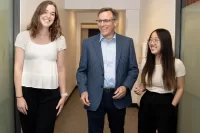
Would you like something to sip on while you read? Coffee or tea? Beer, wine, or rum? Would things go better with a Coke?
How about all six? That’s the menu for a new course, “Six Beverages That Changed the World,” which economist Jim Hughes and six students will design from scratch during Bates’ 2017 Short Term.
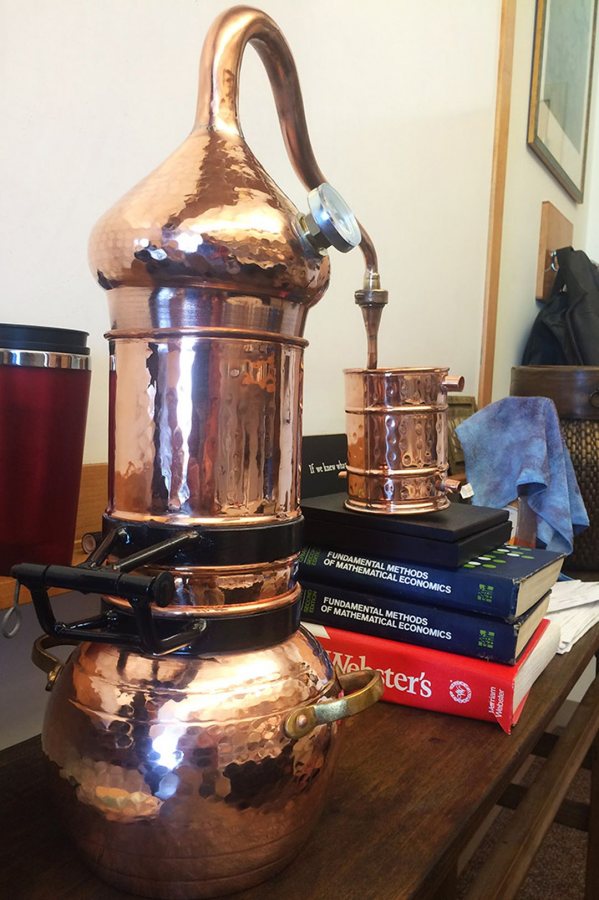
Economics professor Jim Hughes will use this copper still to make rum in the course “Six Beverages That Changed the World.” (Jay Burns/Bates College)
Hughes, the Thomas Sowell Professor of Economics at Bates, says that today’s world is marked by characteristics that resulted from the production, popularity, and distribution of those six beverages. They shaped trade, figured in the rise and fall of empires, and, through their role in the Atlantic slave trade, fundamentally affected the histories and societies of the Americas.
The course will even include lab sessions exploring how those beverages are made. “I think this is the first course taught by an economist at Bates where we needed a Cuisinart, safety glasses, and a fire extinguisher,” says Hughes, who is equipped with a miniature still for making rum.
The “Six Beverages” design process demonstrates the creative potential of Short Term — Bates’ five-week spring semester during which faculty and students choose a single academic endeavor, out of many, to concentrate on.
“Short Term can allow an incredibly intense focus,” says Margaret Imber, associate professor of classical and medieval studies and associate dean of faculty, in which role she designs and coordinates programming for faculty development.
Such a focus “is just a luxury you don’t have during the fall and winter semesters,” she says, when “you know you’ve got competition from the other courses for the mindspace of your students.”
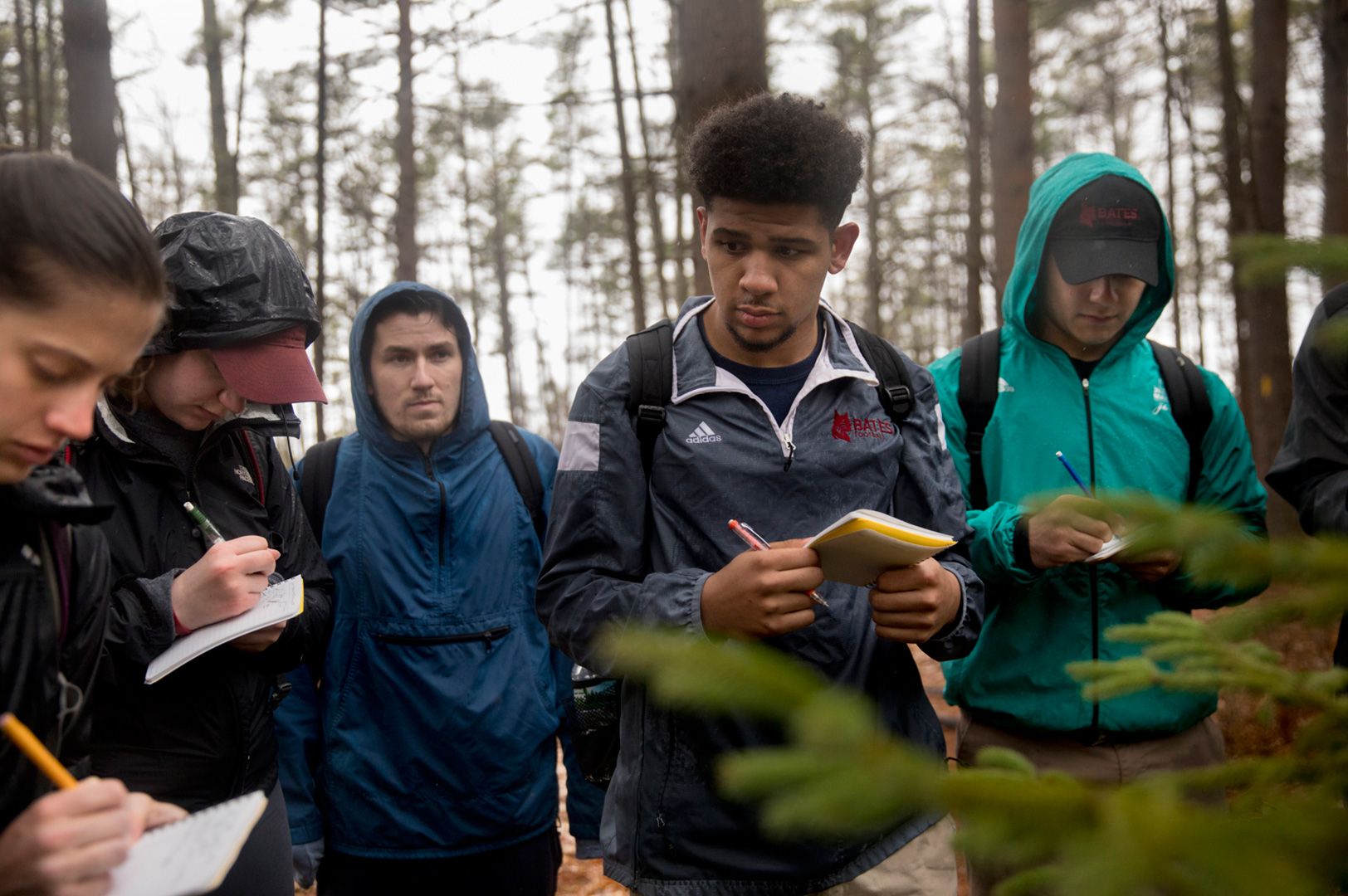
Short Term supports off-campus study in locations far and near. Here, Sara Buscher ’19, Karly Oettgen ’19, Tyler Sorkin ’18, Marcus Ross ’19, and Bobby Dee ’19 make notes about red spruce trees during a Short Term field trip to the Saco Heath Preserve in Saco, Maine. Assistant Professor of Biology Brett Huggett leads the course “North Woods” that brought the group to the preserve. (Phyllis Graber Jensen/Bates College)
In Short Term, Imber says, “you have their complete imagination. And that is just intoxicating.”
Hughes’ course is one of several supported by a program that capitalizes on Short Term’s distinctive qualities. The Short Term Innovative Pedagogy and Course (re)Design program, aka STIP, enables faculty and small teams of students to create brand-new courses or reimagine existing ones for the next academic year.
Students get to craft the look and feel of courses that they and their peers will take. And faculty benefit from the perspective on learning at Bates that only students can provide. “That is a real Bates thing,” says Imber, “where students help design the work that students do.”
Other new courses being designed this Short Term are a first-year seminar piloting the use of iPads in teaching and learning mathematics; and “Experiencing Children’s Literature,” an exploration of real-world conversations and controversies surrounding children’s literature.
Psychology professor Krista Aronson is leading that effort as a complement to the Picture Book Project: A Bates College Collection Portraying People of Color, the unique children’s book collection she has amassed at Ladd Library.
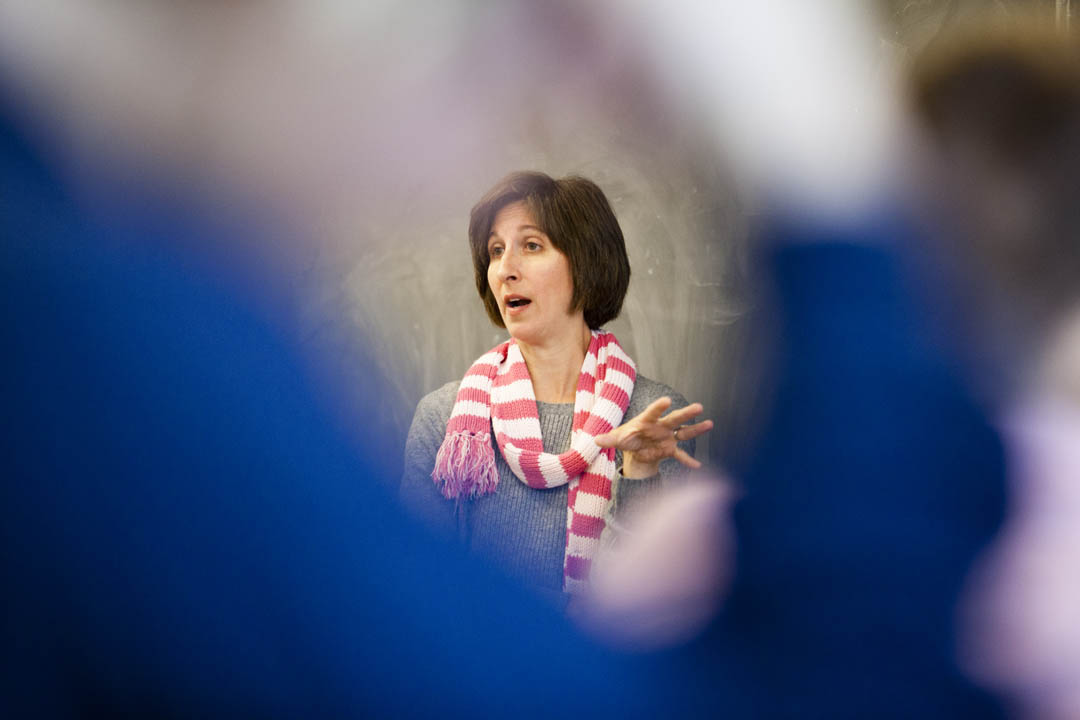
Associate Professor of Philosophy Susan Stark is leading the first redesign of a department’s senior thesis experience during Short Term 2017. (Sarah Crosby/Bates College)
Courses being redesigned this Short Term include, for the first time, a department’s senior thesis experience. Susan Stark, associate professor of philosophy, and students who recently completed philosophy theses are exploring strategies for improving this capstone experience — especially the role that metaphilosophy, or the study of philosophy, might play.
While STIP supports faculty in refreshing the curriculum, Short Term’s Practitioner-Taught Courses feature seasoned professionals in various fields, often Bates alumni, who teach from deep expertise. The PTC is one of three major components of the college’s Purposeful Work initiative, which guides students in aligning their values, interests, and traits of character toward a lifetime of meaningful work.
An example? M.E. Ashley Hart ’91, a veteran marketing expert with 25 years on the national scene, is teaching the digital marketing practicum “Changing the Art and Science of Marketing.” Her students are learning the rudiments of digital marketing the hands-on way: undertaking the steps to build and market a company brand of their own, from research to copywriting to exploiting social media.
In Short Term, “you have their complete imagination. And that is just intoxicating.”
Imber’s “incredibly intense focus,” meanwhile, takes on a different meaning with Short Term “methods” courses, immersive experiences that help students internalize practices and concepts crucial to their majors.
For instance, “Political Inquiry” is an introduction to the array of the approaches used to study politics. The one course that all politics majors are required to take, “Political Inquiry” homes in on the essential practice of identifying and evaluating crucial research decisions.
Taught by professors Stephen Engel and Senem Aslan, this year’s edition uses questions about democracy and democratization as a framework for the concepts of research and writing at issue. “So, for instance, when we discuss conceptualization and measurement,” Aslan says, “we give examples from the democracy literature” — such as, how do scholars define democracy? How do they measure it?
Faculty have long capitalized on Short Term’s one-track structure to get students off campus, and destinations for classes this year range from Alaska (archeological fieldwork) to China (literature and culture) to Germany (an environmental studies visit to the “green city” of Freiburg).
For the second time, Assistant Professor of Biology Larissa Williams will bring a class to study ecology and evolutionary biology in the Galápagos Archipelago. Co-led by Greg Anderson, assistant in instruction, the group will spend three weeks in what, thanks to Charles Darwin, is renowned as the birthplace of the theory of evolution by natural selection.
“That is a real Bates thing, where students help design the work that students do.”
The Galápagos islands, of course, are also well-known for native wildlife not found elsewhere, thanks to geographical isolation that allowed evolution to follow its own path. During its visit, the Bates class is visiting six islands to explore ecosystems terrestrial and marine — explorations that stimulate both the senses and the intellect.

Students and their professor, Larissa Williams, play with a curious sea lion during their 2014 Short Term trip to the Galapagos Islands. (Biology Department photo)
“All 19 of us strutted to the beach in full snorkeling attire, wetsuit and all, through the town of Isabela,” Galápagos participant Hannah Loeb ’16 blogged in 2014, during the first iteration of the course, as she and her classmates headed to the ocean to swim with marine iguanas, sea turtles, Galapagos penguins, sea lions, and colorful fish. “It was definitely quite a sight for the locals.”
If much of what happens during Short Term builds academic muscle, other endeavors allow students to flex those muscles. The Short Term Action/Research Team program operated by the Harward Center for Community Partnerships, for instance, situates students in intensive community-engaged work.
STA/RT research projects range from mental health and public health outreach to the work that Julia Nemy ’18 is doing with Whiting Farm, a nonprofit working farm in Auburn. Nemy, a double major in environmental studies and French from San Francisco, is doing regulatory research to gauge the feasibility of installing an industrial kitchen at the farm.
A challenge facing Lewiston-Auburn in terms of nutrition, she says, “is a lack of resources to teach people how to process and cook their own food.” Kim Finnerty, who runs the farm for the nonprofit John F, Murphy Homes, wants the kitchen “to not only process some of her own crops, but be able to hold cooking classes and lease the space to vendors to process their own items like jams and sauces.”
Nemy’s introduction to agricultural research was quite different from her STA/RT work: During study abroad in Madagascar, she developed a set of case studies representing the agricultural output of one region of the island.
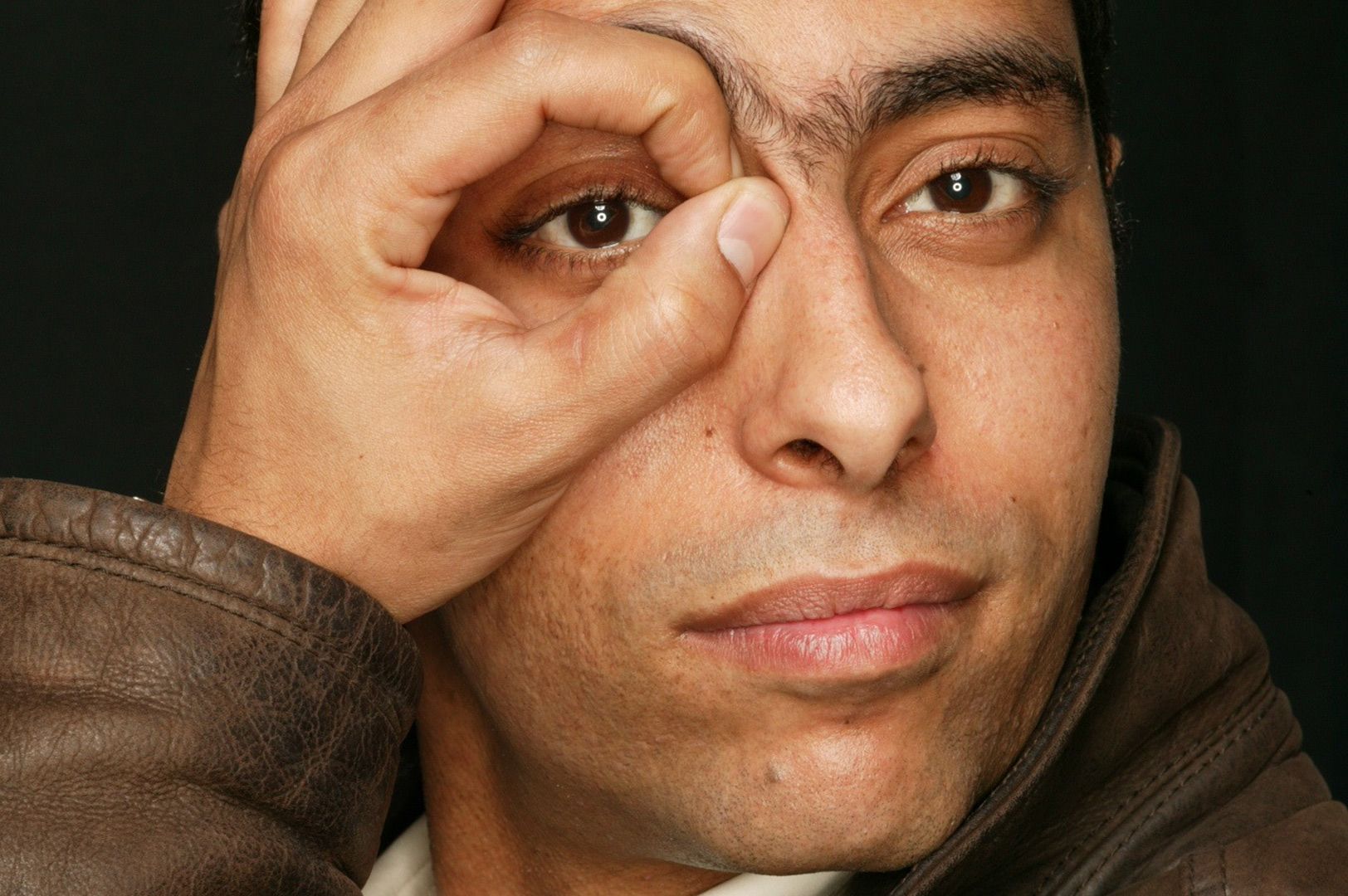
Award-winning Algerian filmmaker Lyes Salem is working with Short Term students in a filmmaking course — conducted entirely in French.
All these offerings point to how, in recent years, Bates has dialed up the academic intensity of Short Term. The work being done is better intellectual nutrition than ever for students, and its impacts are reaching beyond these five weeks to enrich the Bates curriculum overall.
Still, more than five decades after Short Term began, it retains a sense of genre-jumping, free-spirited, going-for-it adventure that animates courses like “L’art du court! Writing, Acting, and Filming a Short Movie.”
This French and francophone studies offering takes students through the process of writing and producing a short film entirely in French. Associate Professor Alex Dauge-Roth has invited actor–filmmaker Lyes Salem to guide the way as students develop characters and dialogue, perform in French, and learn the gamut of filmmaking techniques.
“It’s up to the students to decide where to go with their short films,” says Dauge-Roth. “This course will be fun, allowing them to explore and express emotions, share views about issues, discover the linguistic ‘other’ within themselves — and become familiar with that new ‘moi’ through acting, editing and communicating in French.”

